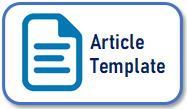Islamic Social Finance: A Bibliometric Analysis
DOI:
https://doi.org/10.14421/grieb.2021.092-02Keywords:
Bibliometric Analysis, Islam, Social, and Finance.Abstract
Islamic social finance was discussed in 2013 by IRTI-IDB as a new spirit in solving the economic problem by allocating funds for humanitarian social works by using zakah, infaq, sadaqah, waqf, qardh al-hasan, and Islamic micro-insurance and Islamic microfinance. Islamic social finance has many imperatives to solve socio-economic problems. Therefore, it is needed to study the current state of Islamic social finance research to date. Thus, the study attempts to explore the status of Islamic social finance literature using bibliometric analysis by identifying statistics number of publications year by year, influential aspects, visualization of co-occurrence of keywords, and data texts related to the topic of Islamic social finance by using VOSviewer software. The finding of the study indicated that few articles discussed Islamic social finance. The most discussion of Islamic social finance was in 2019, which tried to handle the issues of the Covid-19 pandemic. Consequently, the journals that contributed the most to the study of Islamic social finance were al-Shajarah and the International Journal of Islamic and Middle Eastern Finance and Management. IIUM and INCEIF have contributed the most in the literature related to Islamic social finance from the author's affiliation. Malaysia is the most contributing country in writing Islamic social finance literature. Furthermore, the most selected keywords of Islamic finance research are Islamic social finance, maqasid syariah, value-based intermediation, sustainable development goals, and waqf. For the most co-occurrence text data, six clusters discussed the role of Islamic social finance in Covid-19, culture and country case on Islamic social finance, sustainable development goals, ecosystem, and maqashid syari’ah.References
Abbasi, M. Z. (2012). The classical Islamic law of Waqf: A concise introduction. Arab Law Quarterly, 26(2), 121-153.
Abdullahi, A., & Sohail, M. (2021). The role of Islamic social finance in societal welfare : A case study of selected IFBOs in Southwest Nigeria. International Journal of Islamic and Middle Eastern Finance and Management, 15(1), 83-99. https://doi.org/10.1108/IMEFM-06-2019-0229
Dakhoir, A. (2018). Reactualization of the Islamic social finance system of Saprah Amal in Banjar community, Indonesia. Journal of Legal, Ethical and Regulatory Issues, 21(4).
Franzoni, S., & Allali, A. A. (2018). Principles of Islamic finance and principles of Corporate Social Responsibility: What convergence? Sustainability (Switzerland), 10(3). https://doi.org/10.3390/su10030637
Gözübüyük, R., Kock, R. C. J., & U¨nal, M. (2020). Who appropriates centrality rents? The role of institutions in regulating social networks in the global Islamic finance industry. Journal of International Business Studies, 51(5), 764–787. https://doi.org/10.1057/s41267-018-0202-4
Hassan, K., & Cebeci, I. (2012). Integrating the social maslaha into Islamic finance. Accounting Research Journal, 25(3), 166–184. https://doi.org/10.1108/10309611211290158
Kappen, J., Mitchell, M., & Chawla, K. (2019). Institutionalizing social impact investing: Implications for Islamic finance. International Journal of Social Economics, 46(2), 226–240. https://doi.org/10.1108/IJSE-10-2017-0449
Khan, M. M. (2013). Developing a conceptual framework to appraise the corporate social responsibility performance of Islamic banking and finance institutions. Accounting and the Public Interest, 13(1), 191–207. https://doi.org/10.2308/apin-10375
Kuanova, L. A., Sagiyeva, R., & Shirazi, N. S. (2021). Islamic social finance: A literature review and future research directions. Journal of Islamic Accounting and Business Research, 12(5), 707-728. https://doi.org/10.1108/JIABR-11-2020-0356
Mahadi, N. F., Mohd Zain, N. R., & Engku Ali, E. R. A. (2019). Leading towards impactful Islamic social finance: Malaysian experience with the value-based intermediation approach. Al-Shajarah, (Special Issue IslamicBankingandFinance2019), 69–87.
Ng, A., Ibrahim, M., & Mirakhor, A. (2015). On building social capital for Islamic finance. International Journal of Islamic and Middle Eastern Finance and Management, 8(1), 2–19. https://doi.org/10.1108/IMEFM-04-2014-0040
Nicholls, A., Paton, R., & Emerson, J. (2015). Social finance. Oxford University Press
Nor, S. M., Abdul-majid, M., & Esrati, S. N. (2020). The role of blockchain technology in enhancing Islamic social finance : The case of Zakah management in Malaysia. Foresight. https://doi.org/10.1108/FS-06-2020-0058
Pepinsky, T. B. (2013). Development, social change, and Islamic finance in contemporary Indonesia. World Development, 41(1), 157–167. https://doi.org/10.1016/j.worlddev.2012.06.007
Rexhepi, G., & Ramadani, N. (2016). Ethics and social responsibility in Islamic finance. Entrepreneurship and Management in an Islamic Context, September, 1–248. https://doi.org/10.1007/978-3-319-39679-8
Samad, M. A. (2014). Islamic microfinance: tool for economic stability and social change. Humanomics, 30(3), 199–226. https://doi.org/10.1108/H-12-2013-0085
Azman, S. M. M. S., & Ali, E. R. A. E. (2019). Islamic social finance and the imperative for social impact measurement. Al-Shajarah, (Special Issue Islamic Bankingand Finance 2019), 43–68.
Jouti, A. T. (2019). An integrated approach for building sustainable Islamic social finance ecosystems. ISRA International Journal of Islamic Finance, 11(2), 246–266. https://doi.org/10.1108/IJIF-10-2018-0118
Uddin, T. A. (2020). Islamic social finance in Bangladesh: Challenges and opportunities of the institutional and regulatory landscape. Law and Development Review, 13(1), 265–319. https://doi.org/10.1515/ldr-2019-0072
Umar, U. H., Baita, A. J., Haron, M. H. B., & Kabiru, S. H. (2021). The potential of Islamic social finance to alleviate poverty in the era of COVID-19: The moderating effect of ethical orientation. International Journal of Islamic and Middle Eastern Finance and Management. https://doi.org/10.1108/IMEFM-07-2020-0371
Venardos, A. M. (2012). Islamic banking & finance in South-East Asia: Its development & future (Vol. 6). World Scientific.
Islamic Research and Training Institute. (2020). Islamic social finance report 2020. https://irti.org/product/islamic-social-finance-report-2020
Islamic Research and Training Institute. (2020, January 15). IRTI’s pioneering work highlights how Islamic social finance can help end poverty. https://irti.org/success/irtis-pioneering-work-highlights-how-islamic-social-finance-can-help-end-poverty
Downloads
Published
Issue
Section
License
Global Review of Islamic Economics and Business is licensed under a
Creative Commons Attribution-ShareAlike 4.0 International License



















